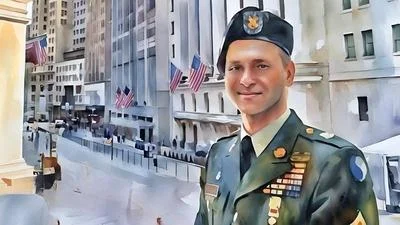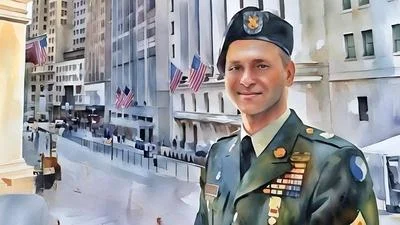Paul Poast is the author of The Economics of War, Organizing Democracy, and Arguing About Alliances. He is an Associate Professor at the University of Chicago, and a nonresident fellow at the Chicago Council on Global Affairs.
Federal Newswire:
It’s been one year since Russia invaded Ukraine, what do we know now that we didn't know then?
Paul Poast:
One way to answer that question is just to quickly recap how we got here. A year ago last week was when Russia invaded Ukraine. It took some people by surprise, but I think a lot of people who were very closely watching the situation expected an invasion.
However, even people who expected the invasion, myself included, were surprised by the extent of the invasion. I think a lot of us were expecting something more limited, maybe an incursion into the Eastern provinces.
A lot of people were surprised by the fact that it seemed like Putin was authorizing use of force to try to conquer the entire country of Ukraine. Really you can think about the past year as going through three phases.
The first phase I would label as the Crimean model…If you go back to 2014 when Russia took control of the Crimean Peninsula, they did so in a lightning operation that resulted in no casualties. It was just simply sending forces quickly into the territory, taking control of it. We call that a fait accompli. Basically, we have the high ground, and now you can't take it.
My sense is that they thought they could do the same thing [in Ukraine] but at scale. That's why the operation was carried out in the way it was back in February of 2022. But of course, Ukraine started to fight back.
As a result, the Russian strategy switched from the Crimean model to what you could call the Chechnya model. If the Crimean model is based on a lightning strike where there's minimal casualties, and almost no use of force by the military… the Chechnya model is the opposite. It is about indiscriminate use of violence against civilian locations. Basically it is a strategy predicated on punishment.
Federal Newswire:
Were the Russians surprised the Ukrainians dared to fight back?
Paul Poast:
[Exactly,] how dare you fight back? You could see where the Russian strategy started to switch to more of the Chechnya model. This is where you saw the missile strikes seeming to indiscriminately go anywhere, just as long as they were causing damage and causing punishment. That was essentially where the second stage moved in.
The third stage then started in the fall following the major offensive that Ukrainian forces launched in September. This was of course enabled by a lot of the armaments that Ukraine was receiving over the past several months from western countries and notably NATO allies.
Those armaments, combined with assistance in planning, allowed the Ukrainian forces to engage in a major offensive that started to put Russia on the back foot. That then led to a response by Russia, which was mobilization of forces.
That is essentially the third phase and we are still in that third phase. You have a response by Russia where there are more Russian forces in Ukraine now than there were at the start of the invasion.
You are in this stalemate situation, where there's now the movement of offensive, counter offensive, minor offensive, winter offensive, potentially a spring offensive. But we're starting to move into a situation that looks, in many ways, analogous to the western front of World War I, where you have a stasis.
Federal Newswire:
How much of Russia's military forces are committed to fighting in Ukraine?
Paul Poast:
It's a great question in terms of trying to get a good sense of a couple angles to this. First of all, the one angle is to say how much of their forces–actual, trained, pre-invasion forces–are dedicated to that. I can't give an exact percentage. But what we do know is the beginning of the invasion took place with a little over a hundred thousand forces. That is not enough to conquer a country the size of Ukraine, unless you think that it's going to be carried out very quickly, as [with] the Crimea model.
Now we're looking at about 300,000 Russian forces in Ukraine. Not all of those are from the pre-invasion forces. Of course, there's been this call up that has been bringing in more people from the Russian population. You also have the hiring of mercenaries.
Of course, a lot of major generals have been killed over the past year. At the same time, the nature of the fighting now is not the type of high-end, tactical [or] strategic planning that you need to have, say, at the beginning of an invasion. It is now much more about just holding territory.
Federal Newswire:
How do the overtures and interjections of the Chinese government in this conflict change the situation?
Paul Poast:
China is indeed a major factor here. The reason is because of the role that they could play analogous to what the Western countries have been playing for Ukraine. As was very famously said by President Zelensky, ”I don't need a ride, I need ammo.”
That is indeed what the western countries have been providing and as much as it is important to laud the efforts by the Ukrainian forces and the resolve of the Ukrainian people, they would not be able to achieve what they've achieved without western assistance.
As the war drags on, and when you couple this with…the economic harm that's been done by Western sanctions, it's important for Russia to have alternative resources.
That's where China comes in. It’s role so far is to take a diplomatic, non-committal position, or to even express flat out neutrality, but be more than happy to continue to purchase Russian energy.
This is not just China. We've seen this with India, we've seen this with Brazil. You could think about it, the organization that Russia is part of, the BRICS, which is Brazil, Russia, India, China, South Africa. Those countries have been assisting Russia. At least in the extent of not flatly condemning Russia, but also being willing to continue to buy Russian energy.
Federal Newswire:
Could the US step up domestic energy production to flood the market and lower the price of petroleum, therefore hindering Russian oil sales to the BRICS countries?
Paul Poast:
This is absolutely part of the overall strategy, or at least the idea behind using the sanctions.
The thing to think about sanctions is they're fully based on the idea of self-harm. The idea behind sanctions is that I believe so strongly in a policy that I'm willing to do economic harm to myself in order to achieve that policy objective, or more specifically to get you to change your behavior. That is what the Western countries have been doing.
But the problem is, Russia has still been able to continue to sell their oil. They have been able to turn to alternative markets. Now what's interesting is those alternative markets have been doing this in a way that very much serves their interest.
India and China in particular have said, we are more than happy to continue to buy Russian oil, but we want to do it at bargain prices. Now, of course, if oil prices were to fall even further… that would do a lot more harm to the Russian economy.
But until that happens, this has allowed Russia to continue on.
Recently the Chicago Council and Global Affairs along with the Levada Center, which is an institute in Russia, polled Russians about the hardship they are experiencing because of the sanctions. Now, you could say some of this might be propaganda…but nearly 80% of the respondents said there was mild discomfort due to the sanctions.
Federal Newswire:
How else is China getting involved in the Russia-Ukraine war?
Paul Poast:
What's become more relevant would be if China were to switch from just providing diplomatic cover and buying Russian oil to becoming a co-belligerent in the war.
This would not be the level of China providing soldiers. The People's Liberation Army is not going to be moving into Ukraine, but could they be providing military aid? Could they provide financing that would allow Russia to be able to continue to fund its war machine? Could they be providing weaponry or technology?
There's been a lot of back and forth about that.
But of course they're going to deny it, just like they denied that the balloon that we were all talking about a few weeks ago was actually a surveillance balloon. If China were to do that, it very much would change the entire complexion of how this war [proceeds].
Federal Newswire:
What are our obligations under the 1994 NATO treaty, where we asked Ukraine to give up their weapons and we would protect them?
Paul Poast:
What you're referring to is the Budapest Memorandum. The idea behind that was going back to the very collapse of the Soviet Union.
Of course, Ukraine was part of the Soviet Union. But the key is, a large portion of the Soviet nuclear arsenal was on Ukrainian territory. When Ukraine became independent, they suddenly found themselves in possession of all of these nuclear weapons. The question became what to do with them and how they should be used.
This became a priority for the Clinton administration in the United States as well as the Yeltsin administration in Russia. Try to figure out a solution of what to do with these, because there was concerns about proliferation in general.
There was an argument made at the time that Ukraine should keep them because of what we're witnessing now. There was a belief in Ukraine, the Baltic States, and all of the former Soviet republics…that Russia would eventually become aggressive again.
The Baltic States immediately sought NATO membership. In the case of Ukraine, NATO wasn't quite on the table. [They thought], maybe we can use these as a deterrent.
They don't have operational control of this. However, maybe they could have been a bargaining chip, or maybe through Western assistance they could have been armed and used. There were a lot of potential things on the table.
Ultimately though, there was an agreement reached between Russia, the United States, Ukraine, and a few other countries to have Ukraine give up their arsenal to Russia in exchange for Russia, the United States and these other countries honoring the territorial integrity of Ukraine. That was the agreement reached.
Now, of course, we can say the agreement was not honored by Russia at all.
On the other hand, that's still where placing troops on Ukraine's territory gets dicey, because you could say, well, now the US is not honoring it's promise to not violate territorial integrity of Ukraine, you’re putting US forces there.
Federal Newswire:
John Mearsheimer (an international relations scholar at the University of Chicago) believes this conflict is the result of NATO's provocative actions over the years. Do you agree with him?
Paul Poast:
I have made very public that I disagree with John on these issues. He and I have a very good professional relationship. I disagree with him, but I do have respect for him as a colleague and as a professional.
In 2014, he wrote an article that was published in Foreign Affairs titled “Why the Ukraine Crisis Is The West's Fault,” or something like that. The title says it all, right?
The idea behind this argument is that Russia is simply fighting a defensive war. They are simply pushing back against the aggression that the western countries in NATO have been putting upon Russia.
What is that aggression? The aggression that John would argue is the idea of NATO expansion, and that since the end of the Cold War, NATO expanded first into Central Europe, then into Eastern Europe, and ultimately into former Soviet republics such as the Baltic States.
His argument is that this was the US pushing to take advantage of Russian weakness. What would be the natural thing for someone to do when they perceive a threat coming closer and closer to their border? Well, that is to lash out. That is essentially his argument.
There's several problems with this argument.
When the Soviet Union collapsed, the eastern European countries, and in particular the former Soviet republics, expected Russia to become aggressive again. They were the ones who wanted NATO membership. It was not the US pushing NATO membership on anybody. In fact, the Clinton administration was very dubious about the idea of NATO eventually expanding all the way to the former Soviet republics.
The real story is that these countries wanted to get into NATO before they did. What we're witnessing now is, Russia does not want to invade the Baltic States, is not invading Poland, and has been very careful about trying to use military force against them
Really the question becomes why was Ukraine not able to get into NATO? There's a whole host of reasons. But that's really the thrust of the argument that I have. This was not something that was pushed on these countries by the United States.
Federal Newswire:
How does this conflict end if the stalemate continues, or does it end?
Paul Poast:
I expect this to be a long war.
That leads to the question, how does it end? And when does it end? Anything that Ukraine would give is probably not politically viable for Ukraine, such as, [taking] the Eastern provinces to stop fighting. That's not going to work.
If the US were to support giving up territory to Russia in order to end the fighting, that sends a very bad message to China regarding Taiwan, as one example.
Moreover, going back to the Budapest memorandum, it's not clear that Russia would commit to any agreement short of their maximal goals. It would simply delay Russia reigniting the fighting.
Federal Newswire:
Can you explain the economics that are at work here and the amount of money the US has pledged?
Paul Poast:
The US is the major economic supporter of Ukraine in terms of military and financial aid. If the US were to stop, that would be a huge blow to Ukraine.
The question becomes, is that sustainable politically and financially?
Let's be honest; the money we're giving to Ukraine is a drop in the bucket compared to the US budget [or even] the defense budget.
If Russia is one of the major threats facing the United States, and if we're able to keep Ukraine fighting Russia, and we're able to do it at a relatively affordable price, then this is a great financial deal for the United States.
Federal Newswire:
If the President said to Republicans we're going to ramp up domestic oil production and in return you allow for more Ukraine funding, do you think that would move the needle?
Paul Poast:
I think [it] could. However, the members of the Republican Party that seem most in favor of cutting aid to Ukraine are primarily about trying to do things that undermine the Biden administration. I'm not sure that they would be willing to give a win to the Biden administration.
Federal Newswire:
What’s something that people are missing or not pointing out about this conflict?
Paul Poast:
I think a key part to understand is Putin's view…It's a matter of timing, and I think Putin's view is that there's an hourglass sitting there that is going to run out. That hourglass is measuring how long it takes for the US to start cutting off aid. He thinks he can hold out for that.
Federal Newswire:
Is Putin expending a lot of effort and even money to influence our domestic politics?
Paul Poast:
I'm not sure about the effectiveness of Russia's efforts to try to influence our elections… Russia has tried to do this. I think that's true. I think we have a lot of evidence. How effective that is, is another matter.









